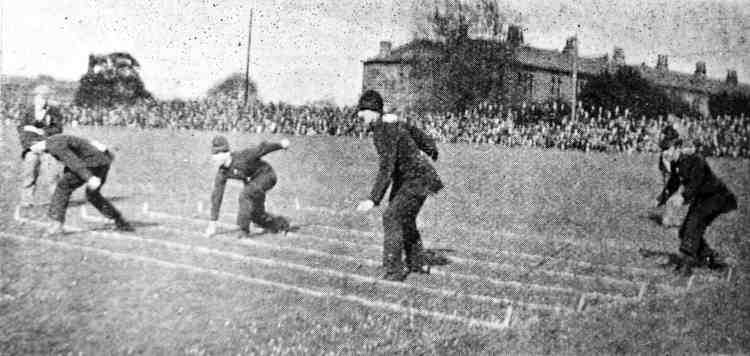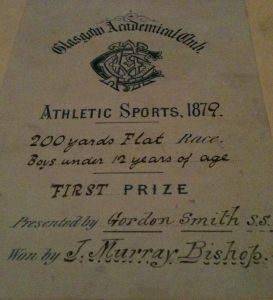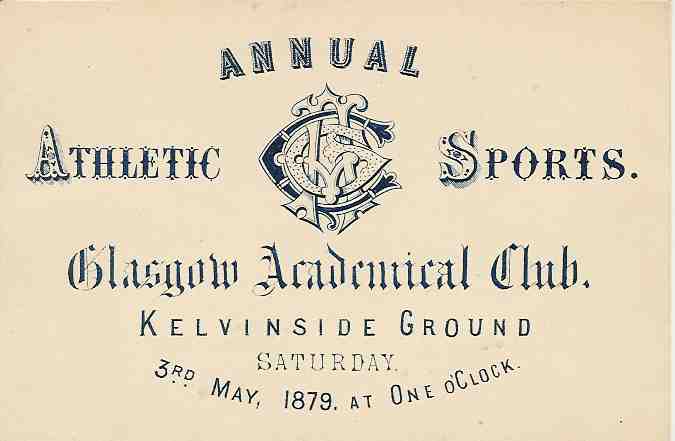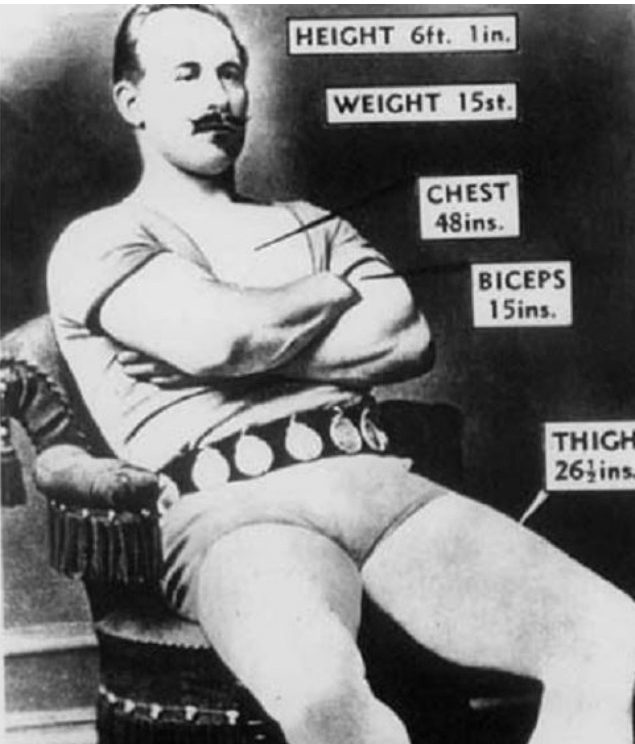Start of the Police ‘Catch the Thief’ race: a feature of the first Rangers Sports – and of the Police Sports mentioned below
Quite often the description of a sports meeting which starts ‘First Annual … ‘ expresses the good intentions of the promoting club which are not followed through by the next year’s committee. This could be because of a change of personnel or of a change of priorities or some new factor coming into play. However it pans out, a good percentage of ‘first annuals’ are not followed through.
In August 1881 both Third Lanark and the Rangers held their ‘first annual’ sports’ a week apart, Thirds being seven days before the Rangers event. The search for the ‘second annual’ begins on Saturday, 1st April, 1882 when there were no athletics meetings reported in the ‘Glasgow Herald’. The ‘Herald’ is the newspaper of choice for the search since the two clubs we are interested in here are Glasgow clubs. The following Saturday, 8th April, there were what were called ‘National Sports’ at Shawfield. In front of a crowd of 1500 people, 36 entered the 160 yards handicap and 29 in the 600 yards handicap which was run as a single race and included a two miles race. The National Sports included highland dancing, bagpipe playing, heavy events, etc and most of the competitors were professionals. On the same day there was a foot race between two men for £4 at Longbar, Beith. Other than a professional walking race in Edinburgh, that was it for the second week in the month. Came 15th April and the main fixture was an amateur athletic meeting run by the West of Scotland Cricket Club at Hamilton Crescent. A well organised meeting, it was not the first in the series, and it included two- one- and half-mile bicycle races, and 100 yards, 120 yards hurdles,200 yards, quarter-mile, half-mile, one mile and, as a source of amusement, a steeple chase with 4 water jumps. There was also an Indian tug of war over water. At Shawfield there were the usual professional races – on this occasion there were the preliminary rounds of a 333 yard handicap race, no fewer than 16 of them. As at the National Sports, the bookies were very busy. On the east coast there were the games of the Edinburgh High School. On 22nd April, the Kilmarnock FC annual sports had their first meeting with the conclusion being held the following week. The main attraction was the football tournament but there were several athletic events – a 100 yards confined to the club, and a mile confined to the second eleven. Larchfield Academical Club also held their sports on that day. These included a 120 yards hurdle race (won by A Vallance of Rangers FC), a 100 yards, a 200 yards, a quarter-mile handicap, a half-mile handicap, and one mile. On the last Saturday of the month, the National Sports took place at Shawfield (“Mr Gilmour’s grounds) involved Donald Dinnie and W Cummings. Kilmarnock FC Sports reached their conclusion with the open athletic and cycling races taking place. In Glasgow, the Glasgow Academical Club held their annual sports on Kelvinside Grounds with a mix of confined and open events.
The Glasgow Academy Sports is one of the very oldest in Scotland. This winner’s ticket is to JM Bishop
(Grandfather of Scottish International Miler, Hugh Barrow)
Into May and the first events were contested on 6th May. The big report was on the Glasgow University Sports at Gilmorehill with the only other event being the weekly day’s professional sport at the Shawfield Grounds. On 13th May, top item in the Glasgow Herald was Watson’s College Sports at Myreside, closely followed by the Edinburgh Royal Gymnasium Sports, which was a professional event with, for example, a prize of £15 for the Mile, watched by a crowd of 2000. Then there was the weekly professional Shawfield Grounds event in Glasgow which this time included a 200 yards dog handicap race. The final of the 333 yards handicap was run and there were great shenanigans in one race with runners being tripped up, cries of foul, the tape being broken by the judges and ‘no race’ being called. And that was just in the heats. The dog race was won by Mollincott from Poodle and Gip. The owner of Poodle claimed that his dog had won and said he would write to the press. There was a foot race in Beith over 160 yards for a £10 prize – two runners forward. There was an amateur sports at Vale of Leven organised by the local cricket club where 3000 spectators watched athletics, cycle racing and four a side football. The next Saturday was the 20th May was the date for the big amateur athletic meeting in Greenock organised by the Greenock Cricket Club, Greenock Wanderers Football Club, Greenock Amateur Bicycle Club and the West of Scotland Amateur Boat Club at Glen Park. “The above four clubs intend, it is understood, making the Glen Park Sports an annual event. The name chosen for the sports is of interest because the Greenock section of the Clydesdale Harriers was given its independence in 1892 and took the name of Greenock Glenpark Harriers. That was the only event of the afternoon and many of the contestants were representing football clubs with a big group from QPFC. .The already well established Alexandra Athletic Club Sports was given top billing on 27th May for their event at Kennyhill Park. Petershill defeated Alexandra Athletic in the four a side football tournament and again, the prize winners lists were dominated by representatives of football clubs with the Queen’s Park athletes but T Dingwall of Third Lanark won the handicap mile confined to the West of Scotland and was second in the Open Mile handicap. The National Games at Shawfield where one of the attractions was to be Donald Dinnie lifting a 230 pound dumb bell from the ground to arm length above his head – this was successfully accomplished: he also won putting the stone, throwing the hammer and tossing the caber. In the wrestling Dinnie qualified for the final when – “When he came to meet Dinnie, Harrison advanced, as is customary, to shake hands, Dinnie refused to accept this token of friendly rivalry. The crowd repudiated this act, and loudly hissed the champion. A rather lengthened struggle took place and Dinnie had some trouble getting the mastery but ultimately threw Harrison heavily twice in succession and won. Harrison was warmly greeted when he left the ground.” There were annual sports held at Dumbarton that day and in the east, Edinburgh Royal Gymnasium held their sports before about 2000 people.
On 3rd June the Kilmarnock Amateur Bicycle Club had their annual sports. One of the most popular of the sports, it was held on the Rugby Ground where although there was a football match and two foot races, it was almost entirely a cycle meeting. The Ayr Academical Sports (which are much looked forward to by the youth of the town) were held on 10th June and had races for all the schools in the area as well as a few for senior athletes and a football match was also incorporated into the programme. There were sports at Shawfield Grounds again – this time mainly heats of a 200 yards race with the final to be held the following week. There were also sports held at Johnstone under the patronage of Colonel Sir Archibald Campbell and held on the ground of the Johnstone Football Club. Donald Dinnie was in action again at Greenock in the National Games held there and in the Borders, the games held in connection with the Hawick Common Riding went off successfully with the main events being wrestling, running. Chief among the wrestlers was G Steedman of Drybeck “against whom none of the competitors had the slightest chance.” The proprietor again presented a very popular show at Shawfield Grounds on 17th June with the finals of the previous week’s 200 yards race plus a half mile handicap. Crescents Park in Pollokshaws was the scene of another popular annual sports. Well attended as these were, the meeting at the Renton in Dunbartonshire was the biggest with 4000 spectators present. The Edinburgh Institution held their annual sports too on that afternoon. The annual Games of the Kilbirnie Football Club took place on 24th June at Stonyholm Park, the Edinburgh University Cycling Club Sports took place at Powderhall with several foot races in the programme and the Shawfield Grounds events took place but were now reported in a separate ‘Pedestrianism’ column.
Donald Dinnie
We are now three months into the summer athletics season and so far not a sign of the second annuals of either Rangers or Third Lanark meetings. It is of course true that their first annuals were in August but dates can change for all sorts of reasons, and because the events are annual, it does not mean that they are inevitably on the same Saturday v=every time round. July is a busy month for summer sports enthusiasts despite the Fair Holiday fortnights taking place. The last Saturday in June saw the South Western Annual Sports in Copeland Road grounds, Govan. As was to be expected many of the local football clubs were represented. This first day of the meeting was largely four a side football with a confined 100 yards and a place kick competition. The seventeenth annual sports and bicycle races of the Edinburgh University AC took place at Corstorphine, and there was a meeting held at Plains, Airdrie.
Into July and the second day of the South Western Sports which was mainly an amateur athletics meeting plus the final of the four a side football. There were over 30 entered for the open 100 yards and all events were well supported.The Edinburgh Annual Games took place at the Royal Gymnasium, Edinburgh, and the Jedburgh Annual Games started with the quoiting at 10:00 am and included athletics. The prizes were of a high order an included silver cups with the 300 yards hurdles winner collecting a purse of gold, second also had a purse of gold and third took home a purse of silver. On Saturday 15th July the Balfron National Games took place. The title has nothing to do with the governing body (if there were one!) but everything to do with national pastimes. The meeting started with a ploughmans’ 100 yards, and included running, jumping, wrestling, quoiting. and a brass band competition with prizes of £12, £7 and £2. There was also the Denny Scottish Games which were professional and after a lapse of ten years the Stirling Highland Games appeared on the schedule: this was largely because the Strathallan Games could not take place that year. It was the success of the Strathallan Gathering that had caused the Stirling meeting to be dropped some years earlier but in the absence of this competition, Stirling filled the bill. The Johnstone Games took place as did the West Kilbride Annual Games and the West Fife Gymnastic Games. There was no football at any of these Games but that would be put right in the final weeks of the summer. On 22nd July the preliminary events for the St Mirren Sports took place with the football maybe taking pride of place. Teams involved included Queen’s Park, Dumbarton, Queen’s Park Rovers, Craigielea Academicals, Arthurlie, Johnstone Rovers, Argyll, St Mirren, Woodside, Thornliebank, Beith and Johnstone Athletic. There were a few cycle and foot races at this meeting. Falkirk Football Club also had a meeting that day – but without any form of football. The Queen’s Own Yeomanry Athletic Sports took place after a space of six years on the South Haugh of Hamilton on 29th July where there was a great variety of athletic events including ’tilting at the ring’. The Glasgow Police Sports took place on Glasgow Green – described as an inaugural sports and in addition to the more usual athletic events there was a ‘Catch the Thief’ race where the policeman, wearing the day uniform gave the thief 20 yards start. On this occasion the thief eluded his pursuers. The Colinton and Currie Games, and the Dalkeith Gymnastic Games took place in the east and Kelso Gymnastic Games in the Borders.
August was when the Third Lanark and Rangers first annual sports took place in 1881, In time the first Saturday in August would be the Rangers Sports day for many decades but on 5th August 1882, the only meeting reviewed in the Glasgow Herald was the Nairn Games where there were ‘athletic sports, bagpipe playing and dancing.’ The big event on 12th August was the Bute Highland Games at the Public Park in Rothesay. There was a very long programme involving athletics, dancing and wrestling with separate races for amateur and professional runners. After the founding of the SAAA in 1883, amateurs would not be allowed to compete in the same meeting as professionals but in 1882, it was thought to be appropriate. There was also a big meeting at the Shawfield Grounds. One of the runners in the sprints was cautioned for not trying and the winner of the mile was Moore – ‘a Glasgow ped who is credited with being a genuine “square” runner’. The prizes were all cash. There were Land Sports at Dumbarton Pier organised by Dumbarton Football Club. Another football club – St Bernard’s FC – had their sports at Powderhall: again they were labelled the ‘first annual’. The football competition here was a five a side as opposed to the more numerous four a sides. The Lauder Games and Horse Races were also held – so far we have had what we were taught as the long jump called the wide jump, the long leap, the broad jump, the running long jump and Lauder referred to it as the Running Spring’ as opposed to the ‘High Spring’. On 19th August the Ayr Academical Athletic Club’s Autumn Sports were held at Springvale Park in Ayr. There were flat races both open and confined, field events (throws and jumps), cycle races, and the report concluded with the remark that there were several other interesting events on the programme without saying what they were. The by mow customary meeting was held at Shawfield, and Crieff Highland Games were held in Market Park before an amazing assembly of the great and good. There were no athletics competitions of any sort reported on in the Glasgow Herald for the last Saturday in August but the Queen’s Park FC meeting was there in its place on 2nd September.
The band of the HLI played throughout the afternoon and there were bicycle races as well as foot races. The great WG George of Moseley Harriers competed and won the mile and half mile but was only second in the quarter mile. The most successful of many nglishmen was DH Brownfield who won three events – including the broad jump. Although there were many football players among the prize winners, there were none from either the Rangers or Third Lanark. The only athletic opposition that the organisers faced was the professional meeting at Shawfield. A week later, 9th September 1882, there was the usual professional meeting at what was called this time round the Shawfield Recreation Grounds and there was a meeting organised by the Dunfermline Cricket and Football Clubs. Away from the central belt there were annual games at Lockerbie and the Edinburgh, Straiton and Pentland Games were held. There were sports organised by the Volunteers but they were the 1st Dumbarton and Renfrew Artillery Volunteers. The only entry under the heading ‘ATHLETICS’ on 16th September was the Paisley Bicycle Race Meeting which was confined to cycle racing with no athletics, football or even tug of war to break the pattern. 23rd September was again a good day for Shawfield with the regular 2000 spectators turning out for the pro sports and the only other event was the small Rosewell Games. The season was effective ended on 30th September when Shawfield saw what was said to be the best running of the season and there was a meeting at the Edinburgh Royal Gymnasium’s own grounds. A match for £10 a side over 150 yards ‘level’ was held at Powderhall and that finished the summer season.
Having looked at what was on offer ever Saturday, as reported in the Glasgow Herald’ from the start of April until the end of September without sight of a sports promoted by either Third Lanark or the Rangers, it would seem that no second annual was held. It should be noted though, that the search was limited to reports in the ‘Glasgow Herald’ Monday editions. The events could have taken place and not been reported; or they may have taken place on days other than a Saturday. These both seem unlikely.



